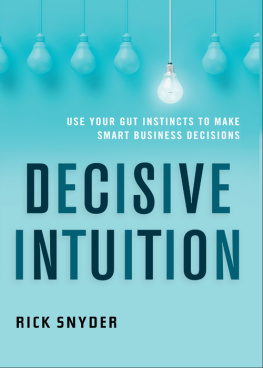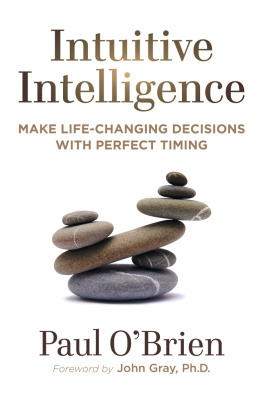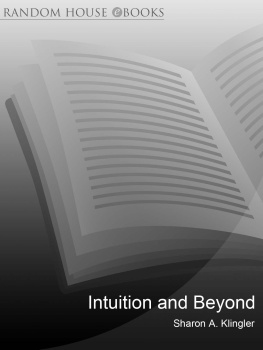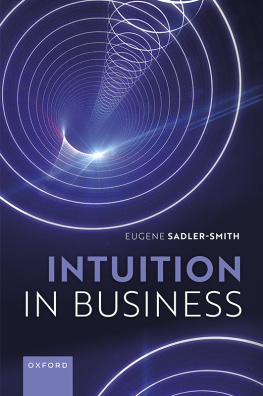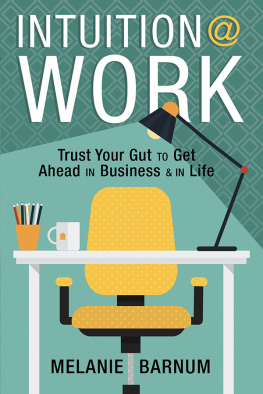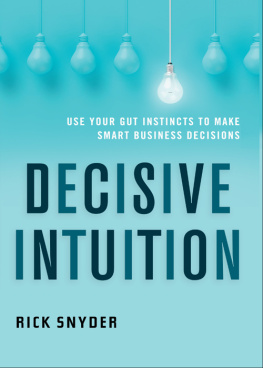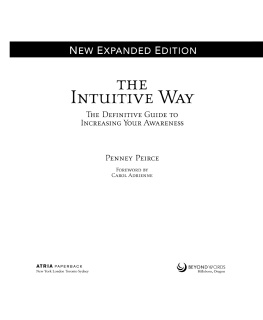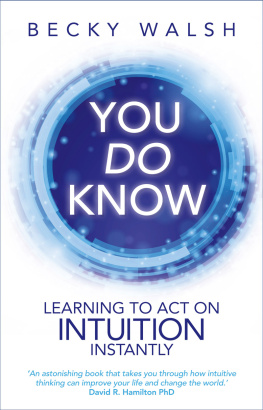
Insightful, daring decisions drive not only a successful business but a fulfilling life. Snyder does a masterful job in showing precisely how to develop and use intuition for greater creativity, better choices, and more empowered leadership. In the process he puts intuition smack in the center of the map, where it should have been all along.
Brian Collins, CEO of COLLINS
If you are looking for a fresh new approach that will help your company set a powerful direction and make a wiser decision that your people can get behind, and create a more alive and engaging place to work, look no further. Decisive Intuition is the blueprint for the empowered and innovative culture you've been waiting for.
Dr. John Demartini, international bestselling author, The Values Factor

This edition first published in 2019 by Career Press, an imprint of
Red Wheel/Weiser, LLC
With offices at:
65 Parker Street, Suite 7
Newburyport, MA 01950
www.redwheelweiser.com
Copyright 2019 by Rick Snyder
All rights reserved. No part of this publication may be reproduced or transmitted in any form or by any means, electronic or mechanical, including photocopying, recording, or by any information storage and retrieval system, without permission in writing from Red Wheel/Weiser, LLC. Reviewers may quote brief passages.
ISBN: 978-1-63265-147-1
Library of Congress Cataloging-in-Publication
Data available upon request.
Cover design by Rob Johnson
Cover image by iStock.com
Interior photos/images by Frank Feinbork
Interior by Gina Schenck
Typeset in Minion Pro and Avenir Next Condensed
Printed in Canada
MAR
10 9 8 7 6 5 4 3 2 1
www.redwheelweiser.com/newsletter
This book is dedicated to the individual divine spark inside us that we carry, often forget, and sometimes have to be reminded about daily. May we each continue to bring our deep listening and curiosity to this subtle whisper, our quiet confidant and reliable copilot that simply wants to guide us toward our greatest triumphs, fulfillment, and joy, no matter how much we kick and scream along the way.
CONTENTS
INTRODUCTION
When you reach the end of what you should know, you will be at the beginning of what you should sense.
Kahlil Gibran
Have you ever had an experience during which you were given a clear, distinct message from inside? An inner guidance that wasn't coming from your head, but from a deeper place within? A sense of where you needed to move, whether that involved staying in or leaving a relationship, a new career path, or a new place to live? I'm not talking about your thoughts, but something even deeper. That was exactly what happened to me.
I felt called to the South of France to write this book while I was still living in Oregon. I'll never forget sitting in my room, looking out the window, and getting a familiar and clear message to move to France. I even looked down at my heart center where the inner voice came from and said, But I don't even speak French! Yet somewhere inside me, I realized that this was secondary to the larger calling that was whispering to me in that moment. I knew that it was time to shake things up for my next life adventure. I needed to follow the deep impulse inside of me. One that wouldn't go away. It didn't make sense to my rational mind, yet I learned to trust my inner guidance and knew that it was coming from a deeper well than the one my logical mind drank from.
I spent many years as a licensed therapist, life coach, business coach, and seeker, always looking for better ways to help people reach their potential, as I looked for the same myself. I immersed myself deeply in several paradigms and methodologies of personal growth, business development, and psychology, yet felt unsatisfied in teaching and leading other people's work. It was time to find my own creative expression. I knew that I needed to get away from everything familiar in order to have a new perspective. I scaled my business so I could operate it remotely, and I wasn't getting any younger. This was my best chance to make a leap into the unknown, guided by my inner GPS, and to live what I wanted to teach.
While working with business owners and managers throughout the past fifteen years in different capacities, I realized that there was a key element missing in the conversations about leadership development, company culture, and innovation. I didn't have the word for it then, but eventually realized there was an invisible edge that certain business owners and managers had that separated them from the rest. Some people embodied an ineffable quality that others naturally followed. The leaders who were comfortable enough with themselves to trust and develop their intuitive skills were the ones willing to take risks and disrupt the business landscape. They were on the leading edge of their lives, and their companies were benefitting. I knew that I needed to live this out in my own right.
It was time to integrate how business, psychology, and intuition fit together in the same conversation in order to help business men, women, and teams innovate to the next level. Business represents for me the grounded way that we transact value in terms of exchanging money for goods and services. Anything can become a business if we translate the value of what we are offering to an interested marketplace. Psychology is how we think about business and ourselves. It is how we do relationships, which is the essence of business. Psychology is at the root of strategy, how we change and adapt as leaders, study our markets, motivate our teams, learn how to communicate more effectively, and establish our overall perspective.
Intuition is our deeper intelligence that is able to read the room or the marketplace, make decisions from a wiser resource, and extract data faster than the conscious mind can analyze. Intuition is an entrepreneur's best friend. Psychology has finally become accepted in the business world after decades of suspicion and caution regarding the value of soft skills versus technical skills. Today, it is rare to find a business owner or manager who doesn't appreciate the advantages and impact of psychology in regards to understanding oneself, staff, and customers. With the advent of Daniel Goldman's book Emotional Intelligence, qualities such as empathy, compassion, and self-awareness are now commonly accepted soft skills and values that need to be developed as much as, if not more than, harder technical skills. Emotional intelligence is understood more than ever as a necessary business principle in terms of staff engagement, healthy communication, and a thriving company culture.
And although the merging of business with psychology for more impactful results is evident, understanding the power of integrating intuition is still in its infancy. This is the missing link in making better decisions, guided by our innate intelligence that draws from our deeper subconscious mind and body. I see intuitive intelligence as a severely underdeveloped resource, and the next wave of business evolution, as we continue to unlock our untapped potential and utilize all of the data inside of us and around us for our best decision-making.
Intuition has gotten a bad rap. It's more often thought of as a touchy-feely, intangible skill, with a mix of superstition, New Age claptrap, and implicit bias, than as a true resource of a deeper intelligence and instinct inherent in each of us. In fact, author, research scientist, and
Next page
